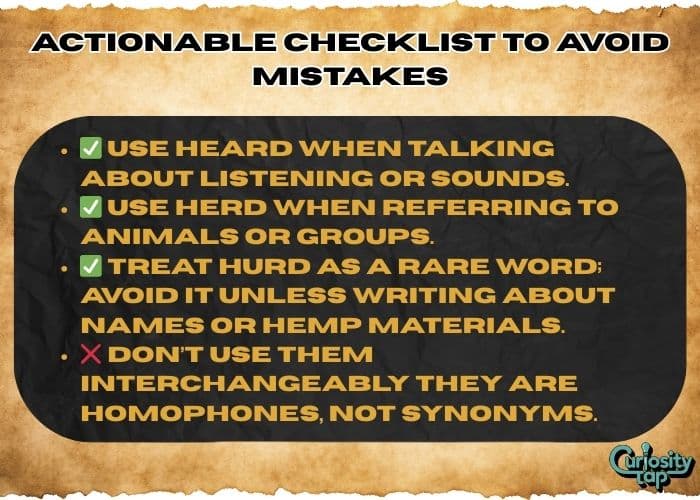Ever seen the words heard, herd, and hurd and wondered if they mean the same thing? You’re not alone. Many English learners, writers, and even native speakers stumble over these similar-sounding words.
The pain point is clear: misusing them can make your writing look careless, confuse readers, or even change your intended meaning.
In this guide, we’ll break down the differences, show you real-life examples, and give you a handy checklist so you’ll never mix them up again. By the end, you’ll feel confident distinguishing heard vs herd vs hurd in everyday writing and speech.
Understanding the Core Meanings
What Does Heard Mean?
- Heard is the past tense and past participle of the verb hear.
- It’s used when you received sound through your ears.
- Example: I heard a strange noise last night.
✅ Key point: Always connected to sound or listening.
What Does Herd Mean?
- Herd is a noun meaning a group of animals, especially large ones like cattle, sheep, or elephants.
- It can also be used as a verb, meaning to gather or move animals together.
- Example: The farmer herded the cows into the barn.
✅ Key point: Related to groups of animals or the act of gathering them.
What About Hurd?
- Hurd is not a standard English word in common dictionaries.
- It is most often seen as a surname (e.g., Richard Hurd), or occasionally in niche contexts like agriculture, where “hemp hurd” refers to the woody core of hemp stalks.
- Example: The company produces hemp hurd for eco-friendly building materials.
✅ Key point: Rare usage; often mistaken spelling of “heard” or “herd.”
Real-Life Example: When Misuse Creates Confusion
Imagine you’re a student presenting your research paper aloud:
“According to my data, I hurd the voices of participants expressing concern…”
At that moment, your classmates giggle. The professor looks puzzled. You meant heard, but by using hurd, you’ve changed the impression. This small mistake may suggest carelessness and distract from your actual point.
Such errors are common in job applications, emails, or even social media posts. Using the wrong homophone can undermine credibility, which is why knowing the heard vs herd vs hurd distinction matters in both academic and professional settings.
Also Read:
Hoodie or Hoody? Choosing The Right Spelling
Of Course or Ofcourse: Correct Spelling Explained
Steam or Steem: What’s The Difference?
Occasion or Ocassion: What’s The Correct Spelling?
Long Term or Long-Term: Right Decision In Writing
Heard vs Herd vs Hurd
| Word | Part of Speech | Meaning | Example Sentence |
|---|---|---|---|
| Heard | Verb (past tense) | Past tense of “hear” | I heard the birds singing this morning. |
| Herd | Noun/Verb | Group of animals; to gather animals | The shepherd guided the herd of sheep. |
| Hurd | Noun (rare) | Surname; hemp core | Hemp hurd is used in eco-construction. |

Actionable Checklist to Avoid Mistakes
- ✅ Use heard when talking about listening or sounds.
- ✅ Use herd when referring to animals or groups.
- ✅ Treat hurd as a rare word; avoid it unless writing about names or hemp materials.
- ❌ Don’t use them interchangeably they are homophones, not synonyms.
FAQs
Is “hurd” a real word?
Yes, but it’s uncommon. “Hurd” mainly appears as a surname or in agriculture (hemp hurd).
Can herd be used for people?
Yes. Metaphorically, you can say “The teacher herded the students into the hall.”
What’s the difference between heard and herd pronunciation?
They are homophones pronounced the same but with different meanings.
How can I remember the difference?
Think: hear → heard (listening), herd (cows and sheep), hurd (rare, names/hemp).
Is “herded” grammatically correct?
Yes. Example: The zookeeper herded the animals safely inside.
Pros & Cons of Each Usage
Heard
Pros: Common, easy to understand, standard grammar.
Cons: Easily confused with “herd.”
Herd
Pros: Clear meaning in animal or group contexts.
Cons: Misused in place of “heard” by mistake.
Hurd
Pros: Useful in niche contexts.
Cons: Rare, confusing, often mistaken spelling.
Conclusion: Mastering Heard vs Herd vs Hurd
Words that sound alike but carry different meanings often trip up even advanced learners. Heard vs herd vs hurd may look similar in writing, but their functions differ widely: listening, grouping animals, and rare niche uses.
Call to Action
Want to sharpen your English and write successfully every time?
Check out our Grammar Checker Tool and never second-guess your spelling again!
Read our guide on Common English Misspellings to boost your skills even further.
Sources List
Sources:
- Merriam-Webster. (2025). Heard. Retrieved from https://www.merriam-webster.com/dictionary/heard
- Oxford English Dictionary. (2025). Herd. Retrieved from https://www.oed.com
- Britannica. (2025). Hemp hurd. Retrieved from https://www.britannica.com/plant/hemp
Read more knowledgeable blogs on Curiosity Tap
Is this article helpful?

Jackson Pearson is a passionate educator and language enthusiast behind the blog Jackson Pearson. With years of experience in teaching and writing, he specializes in simplifying complex grammar rules, breaking down tricky vocabulary, and crafting learning guides that are both engaging and practical. His mission is to help readers boost their English skills whether they’re beginners or brushing up for fluency. Through every article, Jackson brings clarity, structure, and a spark of curiosity to the world of English learning.



